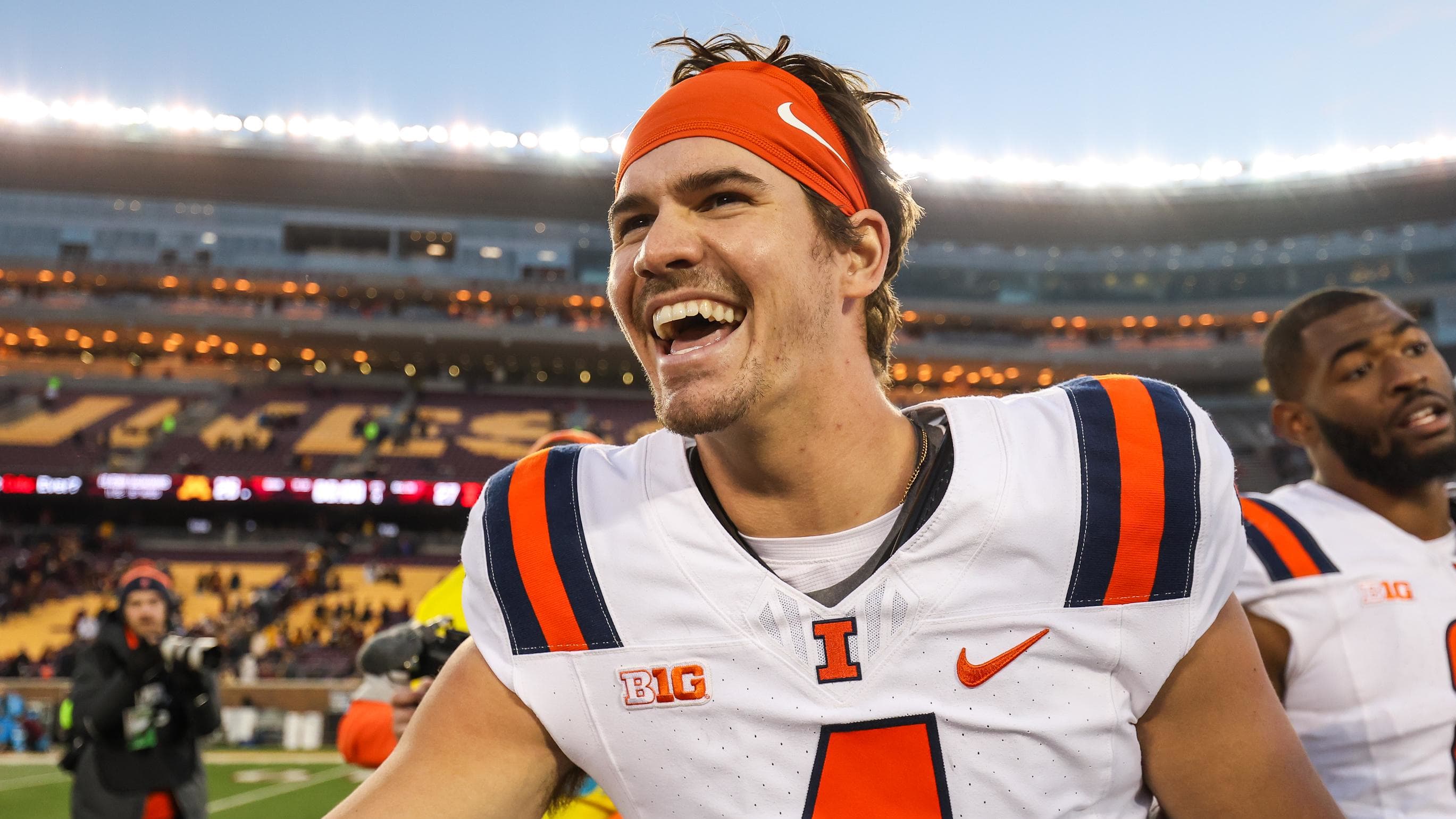Oregon
HoF QB Puts Broncos On Notice About Oregon QB Bo Nix

Bo Nix, a potential Denver Broncos draft target, hails from Dan Fouts’ alma mater of Oregon. With such a common thread, the legendary Hall-of-Famer shared an intriguing take on the 24-year-old Nix as the 2024 NFL draft looms.
Fouts has never been shy about sharing his opinions on NFL quarterbacks. While he can be uncomplimentary at times, his take on Nix gives Broncos fans cause to sit up a little straighter in their seats.
“He’s a good one. He’s bigger than you think (for being listed at 6-foot-2) and he’s very accurate,” Fouts said via Chris Tomasson of The Denver Gazette. “And his accuracy is as good on the run as it is in the pocket, which is unusual obviously. He’s a player, a real competitor. He’s really smart. He’s got a great future.”
What happens next for the Broncos? Don’t miss out on any news and analysis! Take a second, sign up for our free newsletter, and get breaking Broncos news delivered to your inbox daily!
The biggest knock on Nix is the pervading perception that he doesn’t have the kind of arm to deliver the ball consistently down the field at the next level. In fairness, stretching the field wasn’t something that Nix was asked to do that much within Oregon’s short precision passing attack.
The statistical evidence remains compelling, especially if you choose to take even a cursory glance at Nix’s resume. He completed a whopping 77.4% of his passes at Oregon, and he tossed 45 touchdowns against an astonishingly meager three interceptions. And his 61 college starts are the most in NCAA history for a quarterback.
Strangely enough, Nix’s consistency as a pinpoint passer only presents further questions about his purported lack of arm strength heading into the draft. Fouts has been watching Nix for quite some time, though, and he believes the former Ducks star has the fundamental mechanics to make every throw in the book when called upon.
“I watched every game and I didn’t see him not complete long balls,” Fouts said. “I thought he’s got an arm that will surprise because he’s quick and he’s got great mechanics. He’s got an arm that can reach down the field.”
Broncos head coach Sean Payton isn’t really looking for a bombs-away type quarterback to work within his system anyway. Fouts has offered up some reassurance that Nix has an NFL arm to throw the long ball, but what he did as a short-range passer at Oregon could prove much more attractive to Payton anyway.
When the rubber finally meets the road on April 25, the bigger question to answer will be whether Payton believes Nix is truly worthy of the Broncos’ precious No. 12 overall selection. Using such a high-value pick on Nix will always be second-guessed, so Fouts knows that maybe his glowing review of the Oregon passer’s skill set might not be taken at face value.
“Well, if the Broncos are willing to send me a check for the scouting report on him I just gave, yeah, I’d recommend him,” Fouts jokingly remarked.
Reaching for a quarterback in the draft is a nightmarish scenario that may well be keeping Payton up at night, but Fouts’ analysis of Nix might soothe Payton and help him sleep a little easier.
Follow Mile High Huddle on X and Facebook and subscribe on YouTube for daily Broncos live-stream podcasts!

Oregon
Flavored tobacco ban clears Oregon court hurdle

The Oregon Court of Appeals has upheld a Washington County ordinance barring the sale of flavored tobacco products, in a ruling that could have ramifications for a similar ban in Multnomah County.
Wednesday’s ruling reversed a 2022 decision from Washington County Circuit Judge Andrew Erwin, who said the county had the power to regulate how sales are made but that only the state had the authority to ban products completely.
Oregon
Appeals court rejects climate change lawsuit by young Oregon activists against US government

SEATTLE – A federal appeals court panel on Wednesday rejected a long-running lawsuit brought by young Oregon-based climate activists who argued that the U.S. government’s role in climate change violated their constitutional rights.
The 9th U.S. Circuit Court of Appeals previously ordered the case dismissed in 2020, saying that the job of determining the nation’s climate policies should fall to politicians, not judges. But U.S. District Judge Ann Aiken in Eugene, Oregon, instead allowed the activists to amend their lawsuit and last year ruled the case could go to trial.
Acting on a request from the Biden administration, a three-judge 9th Circuit panel issued an order Wednesday requiring Aiken to dismiss the case, and she did. Julia Olson, an attorney with Our Children’s Trust, the nonprofit law firm representing the activists, said they were considering asking the 9th Circuit to rehear the matter with a larger slate of judges.
“I have been pleading for my government to hear our case since I was ten years old, and I am now nearly 19,” one of the activists, Avery McRae, said in a news release issued by the law firm. “A functioning democracy would not make a child beg for their rights to be protected in the courts, just to be ignored nearly a decade later. I am fed up with the continuous attempts to squash this case and silence our voices.”
The case — called Juliana v. United States after one of the plaintiffs, Kelsey Juliana — has been closely watched since it was filed in 2015. The 21 plaintiffs, who were between the ages of 8 and 18 at the time, said they have a constitutional right to a climate that sustains life. The U.S. government’s actions encouraging a fossil fuel economy, despite scientific warnings about global warming, is unconstitutional, they argued.
The lawsuit was challenged repeatedly by the Obama, Trump and Biden administrations, whose lawyers argued the lawsuit sought to direct federal environmental and energy policies through the courts instead of through the political process. At one point in 2018, a trial was halted by U.S. Supreme Court Chief Justice John Roberts just days before it was to begin.
Another climate lawsuit brought by young people was successful: Early this year the Montana Supreme Court upheld a landmark decision requiring regulators to consider the effects of greenhouse gas emissions before issuing permits for fossil fuel development.
That case was also brought by Our Children’s Trust, which has filed climate lawsuits in every state on behalf of young plaintiffs since 2010.
Copyright 2024 The Associated Press. All rights reserved. This material may not be published, broadcast, rewritten or redistributed without permission.
Oregon
Federal cannabis reclassification could bring pharmaceutical companies to Oregon’s marijuana industry

The Biden administration is moving to reclassify cannabis as a Schedule III drug, which would remove the plant from the “most dangerous” list and recognize that it has medical uses.
The Biden administration is working towards reclassifying cannabis as a Schedule III drug. If this is successful, cannabis will no longer be considered as one of the “most dangerous” drugs, and its medical benefits will be recognized.
Kristian Foden-Vencil / OPB
Portland attorney Amy Margolis sees the move as a way to get much-needed research on cannabis, but it could also pave the way for big pharmaceutical companies to get involved in the established industry in Oregon.

Amy Margolis is a Portland attorney specializing in cannabis law and policy.
Courtesy Amy Margolis
“They’re the ones who will be legally operating if they follow the final rules produced by the FDA and the standard FDA approval and sales process for pharmaceuticals,” Margolis says. “It certainly injects a concern that now we have real big pharmaceutical interests involved in the cannabis market.”
Margolis runs Margolis Legal, a Portland law firm that works with clients in the cannabis industry. She says this proposal doesn’t do what many in the industry have been advocating for; removal of cannabis from the schedule of illegal drugs entirely.
“I think it’s a remnant of the drug war, ” she says. “I think it’s kind of outdated perspectives on cannabis being a hard drug.”
Margolis spoke with OPB “All Things Considered” host Geoff Norcross:
Geoff Norcross: Basically speaking, the Biden administration is saying they want to officially recognize that cannabis is not as dangerous as the most dangerous drugs. Isn’t that a good thing?
Amy Margolis: Theoretically, that’s a good thing. We’ve long known that cannabis is not dangerous, should be treated like alcohol, which this does not do. But in theory, yes, that’s a good thing. How it impacts the market? We’re not so sure.
Norcross: Okay, what could happen?
Margolis: So what this did is it sent over the reclassification recommendation to the FDA to essentially rule make around it. And from my perspective, and I think the perspective of many of my peers, this simply opened up a pathway for pharmaceutical companies to get involved in the cannabis industry, whether through the development and sales of pharmaceutical cannabis or through the research component.
Norcross: And what would that mean for the local market, which doesn’t have a lot of big players like the pharmaceutical industry in it?
Margolis: Other than the DOJ, there was not too much outside interests who might care if prosecutions were happening, who might care if statewide industry is developing. I think the risk for Oregon — and this is sort of a worst-case scenario — is that pharmaceutical companies can now get involved. They’re the ones who will be legally operating if they follow the final rules produced by the FDA and the standard FDA approval and sales process for pharmaceuticals. Now you have a player beyond just the Department of Justice who could have some interest in owning that market. It certainly injects a concern that now we have real big pharmaceutical interests involved in the cannabis market. And they’re the only ones who can lawfully operate.
Norcross: One of the big problems for the cannabis industry here has been the lack of banking services or tax breaks that other businesses get. Would this move by the federal government this week change any of that?
Margolis: I think it remains to be seen. You know, the banking industry will look at this, federal regulators will look at this, and try and decide if this clears up the legality around the state licensed recreational and medical markets. And I do not believe this move by the Biden administration does that. I don’t believe it legalizes on a federal level what is currently happening in this state. And that is, aside from federal legislation, the path forward to safe banking.
Norcross: You touched on this a little bit earlier, that what the federal government could have done was to treat cannabis like it’s alcohol, and let an entirely different federal agency, the ATF, oversee its use and the regulations around it. I’m wondering if the Biden administration may have missed an opportunity to go all the way and just take it off the schedule of drugs entirely.
Margolis: I think “missed an opportunity” is how the industry will view it. I mean, the industry in Oregon and across the country has been advocating for cannabis to be declassified and not reclassified. And I think the Biden administration knows that and instead chose to go this direction. I think it’s a remnant of the drug war and I think it’s kind of outdated perspectives on cannabis being a hard drug. We’ll see if this is maybe the first step, but I’m concerned that, for the federal government, first steps can last a long time.
Norcross: Do you see any upside for the industry here in Oregon, if cannabis is reclassified in this way?
Margolis: I do think the upside is, you know, we have in the industry been talking about research and cannabis for a long time. And this does open the door to that, which I think will be a positive, even if it’s only a financial benefit to those in the pharmaceutical industry.
Click on the audio player above to hear the whole conversation.
-

 Education1 week ago
Education1 week agoVideo: Dozens of Yale Students Arrested as Campus Protests Spread
-

 News1 week ago
News1 week agoLarry Webb’s deathbed confession solves 2000 cold case murder of Susan and Natasha Carter, 10, whose remains were found hours after he died
-

 World7 days ago
World7 days agoHaiti Prime Minister Ariel Henry resigns, transitional council takes power
-

 Politics1 week ago
Politics1 week agoFetterman hammers 'a–hole' anti-Israel protesters, slams own party for response to Iranian attack: 'Crazy'
-

 World1 week ago
World1 week agoPeriod poverty still a problem within the EU despite tax breaks
-

 World1 week ago
World1 week agoUS secretly sent long-range ATACMS weapons to Ukraine
-

 News7 days ago
News7 days agoFirst cargo ship passes through new channel since Baltimore bridge collapse
-

 World1 week ago
World1 week agoTurkey’s Erdogan meets Iraq PM for talks on water, security and trade



















